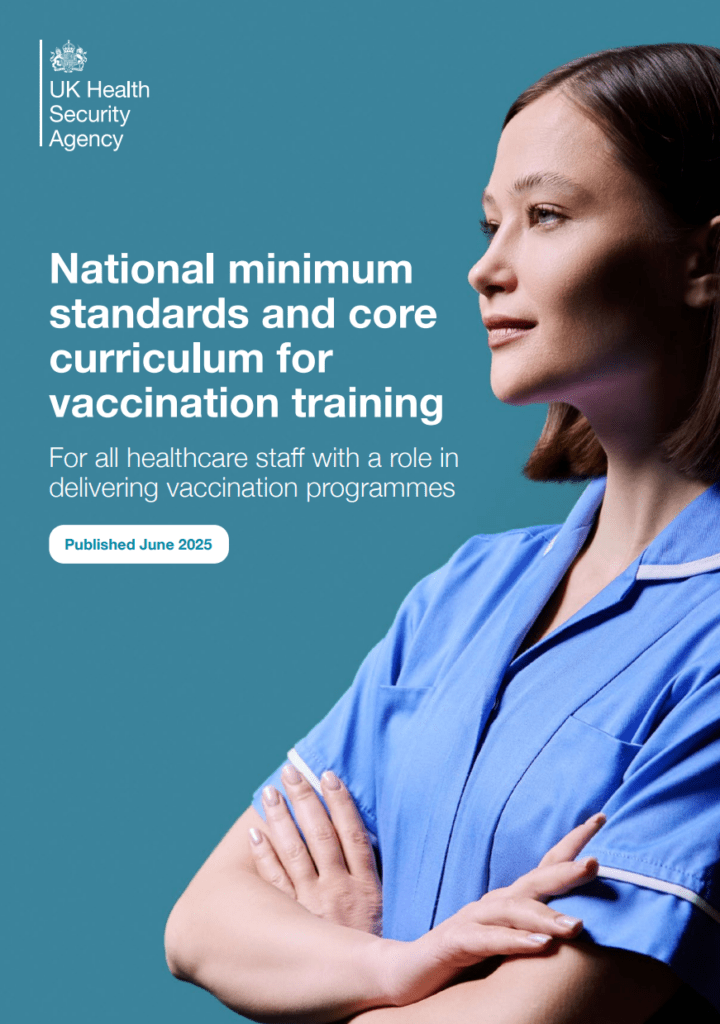
If you’re a practice nurse, healthcare support worker, pharmacist or anyone who works in immunisation, and you’re feeling a bit overwhelmed by the ever-evolving UK vaccine schedule changes… let’s just start with this: you’re absolutely not alone.
Keeping up is proving tough for all of us. New vaccines. Revised eligibility. Tweaked timings. Shifting advice depending on age, risk group, vaccine product, availability….or lack of it. Add in overnight Green Book updates and it’s no wonder many of us feel like we’re always a step behind.
But let’s try to reframe it: these changes are all a sign of progress. Real, evidence-based, public-health-progress-in-action kind of progress. We’re witnessing (and are part of) a period of rapid advancement in vaccine science and public health policy, and that’s something to be proud of. New vaccines are protecting more people than ever. Schedules are being refined to improve outcomes. And even if it feels relentless at times, it’s also worth celebrating.

The pace of change in the last year alone has been like nothing we’ve seen before. Every month seems to add something new to learn, implement, or explain, often all three at once. When you’re running busy clinics, juggling specialisms, and doing your best to give clear answers to real patients in real time, it’s no wonder your brain feels like it’s hit capacity or you feel like you’re having an adverse reaction to your email inbox.
So let’s take a moment to acknowledge, and genuinely appreciate, the sheer volume of changes we’ve all navigated (successfully) together in just the past few years:

The changes aren’t slowing down either. Here’s just a taste of what’s ahead:

And in the pipeline:

Every update, trial, and tweak is part of a larger story: protecting more people, more effectively. It’s a lot, yes. It’s fast. Sometimes frustrating. But it’s also meaningful. These aren’t just abstract policy shifts, they’re real progress, with real impact. And it’s you who turns that progress into protection.

We’ve heard from so many nurses who say they feel behind, unsure, or anxious that they’re not doing things “right.” We all want to do the best for our patients, and when the goalposts keep moving, it’s natural to feel like we’re falling short.
But here’s the truth: if you care enough to worry, you’re already doing a brilliant job.
Still, we all need ways to cope….and to keep our knowledge sharp without burning out.

Let’s be honest: tracking all of this can feel like a full-time job on top of your actual full-time job. Try these small, manageable habits:
1. Find Your Vaccine Tribe: Connect with peers through WhatsApp groups, online forums, or local networks. A problem shared is a problem halved.
2. The 15-Minute Rule: Carve out just 15 minutes a week to scan official sources. Make a cup of tea, call it “protected learning time,” and check for updates from the Green Book, UKHSA’s Vaccine Update, and your local immunisation team.
3. Create a Culture of Curiosity: No one can memorise everything. Make it normal to ask questions in team huddles and support each other’s learning. A “vaccine champion” in the team can streamline this process.
4. Make it Visual: Stick updated schedules and eligibility charts inside cupboard doors or by the vaccine fridge. Constant, passive exposure helps make information stick.
5. Link it to a Patient: Abstract guidance is hard to remember. When a new situation arises with a patient, use it as a real-time trigger to look up the latest advice. Context makes everything clearer.
6. Bookmark Your Core Resources: Green Book chapters, ImmForm, UKHSA bulletins, and your local SOPs, PGDs, keep them saved and easily accessible. Subscribe for alerts and updates.
7. Keep a Mini Learning Log: Jot down things you learn or changes you come across each week in a small notebook or digital note. It’s low effort, and it builds into a helpful resource to reflect on or share with new staff.
8. Teach to Learn: If you’ve recently wrapped your head around a change, share it! Explaining something to someone else helps reinforce your own understanding, and strengthens the whole team.
9. Explore Additional Resources: One of our amazing trainers, Alys, has created a brilliant website to help immunisation and travel health professionals stay up to date: Alys’s Classroom…bookmark it, use it, share it!
10. Prioritise Training Opportunities: Annual updates and refresher sessions are goldmines of shared learning. They’re a chance not just to learn but to ask questions, share confusion, and hear what others are doing.
When you’re swamped, it’s easy to think: “I’ll catch up later”. Yet, even small updates can have a big impact:
Vaccines are one of the most powerful public health tools we have. Every vaccination done right means one more person protected, and you are the reason that happens.

If you’re feeling overwhelmed by the pace of change, you’re not failing. You’re human.
Keeping up is tough, even for those who train others. But by carving out a little time, supporting each other, and staying grounded in the “why,” we can manage this.
You don’t have to know everything. And you don’t have to do it alone. This work is hard, yes, but it matters. Every time you double-check the guidance, ask a question, or update your practice, you’re making a difference.
So the next time you feel overwhelmed, remember: we’re all in this together. Your efforts genuinely matter. And the lives you help protect? They’re the quiet proof it’s all worth it.

With all these changes, high quality training isn’t just “nice to have”, it’s essential. In June 2025, a new version of the National Minimum Standards and Core Curriculum for Vaccination Training was published. One of the biggest updates? It merged the guidance for Registered Healthcare Practitioners and Healthcare Support Workers into a single, unified framework. This move acknowledges the vital roles both groups play in immunisation delivery and aims to ensure consistency, clarity, and quality in training across all levels of practice. If you haven’t already, now’s the time to check the updated standards and consider how they affect your role, your team, and your ongoing training needs.
At Health Academy, we offer a wide range of Immunisation Training options, from virtual Zoom sessions and self-paced e-learning, to face-to-face workshops tailored to your team’s needs. Whether you’re new to immunisation or just trying to keep up with the latest changes, we’re here to help.
Visit our Immunisation course page and get in touch today to see how we can support you and your team in staying confident, current, and compliant.
Giving you written and video content to answer all your questions on primary care education from Phlebotomy to Travel Health.
Subscribe now to be kept updated with our latest posts and insights.
Start typing to search courses, articles, videos, and more.
Notifications